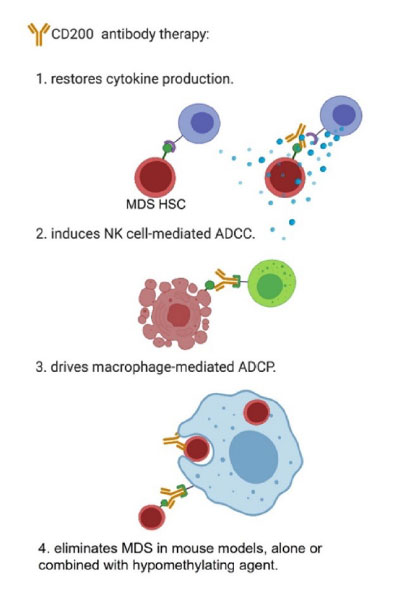
Researcher Profiles

Marina Konopleva, M.D., Ph.D.
Albert Einstein College of Medicine
2025 Funding Recipient
Targeting CD200 as a stem cell-specific checkpoint of immune evasion in MDS
Discovery Research Grant 2025
PROJECT SUMMARY
 Blood disorders like myelodysplastic syndrome (MDS) are very difficult to treat and are mostly incurable, even though we have learned a lot about these diseases and have new treatments. MDS is caused by problems in blood-forming stem cells, which develop errors in their DNA. These errors, called mutations, help the cells survive and grow. Even though we have treatments, such as hypomethylating agents (HMAs), they don’t eliminate the bad stem cells, and over time, these cells can get even more mutations and turn into a aggressive disease called acute myeloid leukemia (AML).
Blood disorders like myelodysplastic syndrome (MDS) are very difficult to treat and are mostly incurable, even though we have learned a lot about these diseases and have new treatments. MDS is caused by problems in blood-forming stem cells, which develop errors in their DNA. These errors, called mutations, help the cells survive and grow. Even though we have treatments, such as hypomethylating agents (HMAs), they don’t eliminate the bad stem cells, and over time, these cells can get even more mutations and turn into a aggressive disease called acute myeloid leukemia (AML).
One of the main reasons we have not made more progress in treating MDS is that we don’t fully understand what makes these bad stem cells survive when healthy blood-forming cells don’t. These tumor cells are able to survive and grow in the bone marrow, where blood cells are made. Another important factor is the tumor’s environment, which helps the tumor cells grow. The immune system, which is usually able to destroy abnormal cells, is weakened in MDS and allows the tumor to grow.
We are studying a protein called CD200, which we found on the stem cells of leukemia. We learned that CD200 helps the tumor by preventing the immune system from attacking it. When we blocked CD200 with an antibody, the immune system was able to attack and destroy the leukemia cells. We looked at CD200 in MDS and found that it is also high on the MDS stem cells, especially in patients who are at a higher risk of developing AML.
